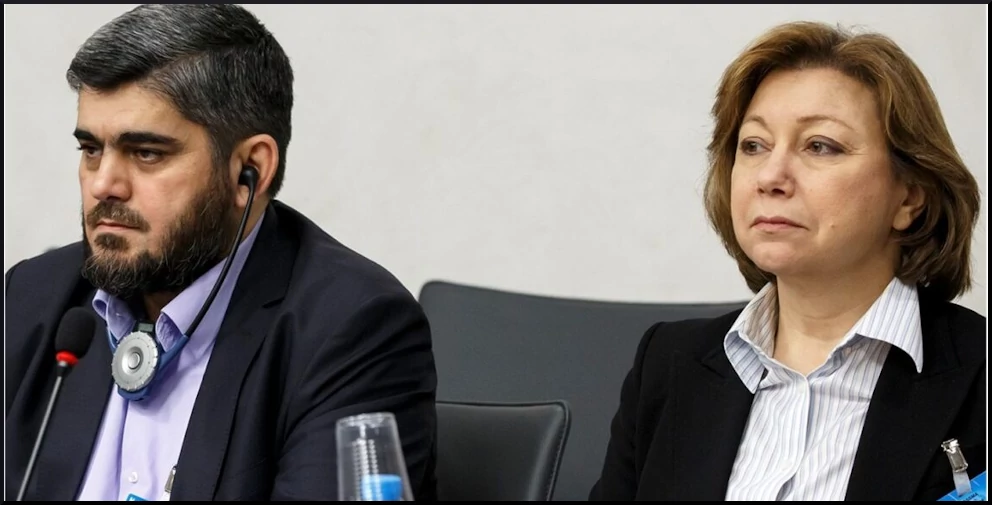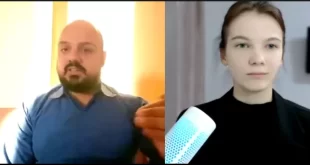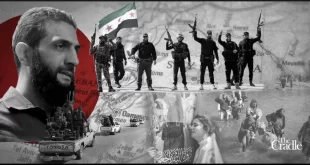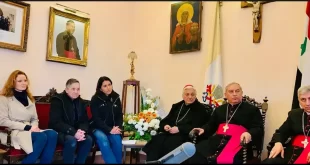by Steven Sahiounie, published on Mideast Discourse, March 5, 2023
Dr. Bassma Kodmani died March 2, 2023, in Paris, where she had lived most of her life. She was a Franco-Syrian activist who played a large role in the destruction of Syria beginning in 2011.
Kodmani was born in Damascus in 1958, but at age 10 her family left Syria. Her memories of Syria would have been limited to recollections of relatives, birthday parties, and holidays with friends and family in one of the most beautiful cities in the world. Her adult world was Paris, France, and there she was a much respected and successful academic and intellectual. Kodmani held a Ph.D. in Political Science from Sciences-Po in Paris and was awarded the Légion d’Honneur of France as Chevalier in 2012.
In 2011, she became Head of Foreign Relations and spokesperson with the Syrian National Council, which she had co-founded, but resigned from in 2012 after the Muslim Brotherhood targeted her for ouster from the opposition group. Kodmani, Burhan Ghalioun, and others resigned in 2012 citing that the Muslim Brotherhood had usurped power in the group.
When several members of the council resigned they cited the overwhelming influence of the Muslim Brotherhood as a reason for their decision. “The Brotherhood took the whole council,” departing council member Walid al-Bunni told the New York Times. “We became like extras.”
The Muslim Brotherhood is a Radical Islamic terrorist group that is banned in Egypt, Saudi Arabia, UAE, and Syria. They hold the same political platform as ISIS, Al Qaeda, and other terrorist groups. They are not banned in the US and were a tool used by US President Obama in his US-NATO attack on Libya, Egypt, and Syria.
Burhan Ghalioun is a French-Syrian professor of sociology at the Université de Paris III Sorbonne University in Paris and the first chairman of the Syrian opposition Transitional National Council. He was named chairman on 29 August 2011.
In June 2012, while Kodmani was still with the Syrian National Council, they held a meeting in Istanbul which was attended by US Secretary of State Hilary Clinton. She was well aware that the majority of Syrians living in Syria were not supportive of the opposition movement abroad.
“There are still many inside Syria who are not convinced that there can be a transition that would not make the situation worse for them – their families, their group, their location,” said Clinton. She was right. The average Syrian was not in favor of chopping off the heads of their neighbors just because they were from a different religion or sect. Syria was a secular country and most wanted to remain so. The rejection of the Syrian Muslim Brotherhood is what defeated the Syrian opposition which was funded by the US, EU, NATO, Qatar, Turkey, and Saudi Arabia.
Syrian women in Damascus today would have almost nothing in common with Kodmani other than some shared DNA. When a child’s candy bar had cost 50 Syrian Lira in 2011, but now costs 4,000, could Kodmani have been able to share what Syrian women lived in her experiment to bring democracy to Syria at the end of the barrel of a gun?
Kodmani was a French woman of Syrian ancestry. She understood the history of Syria from textbooks, not from life. She lived the Syrian experience second handedly by long distance. She longed to bring her western political culture to her ancestral home, but never considered if the Syrians living in Syria wanted her version of life, or if they could afford the destruction of an armed revolution. She insisted on imposing her personal view of utopia on a population far removed from her culture.
One of the many organizations Kodmani was a co-founder of, was the NGO in Paris, ‘Initiative for a New Syria”. If her goal was to create a ‘new’ Syria, she did succeed. The new Syria of today is poorer, sitting in ruins in many areas, and unable to begin any repairs other than sweeping up. In her new Syria, the middle class is the new poor, and the former poor are destitute and starving. Kodmani’s new Syria has 30 minutes of electricity at three intervals per day. The new Syria has medical equipment sitting idle for repair in hospitals due to the US-EU sanctions which prevent western companies from selling products to Syria. The humanitarian exemption is timely and costly and prevents most companies from taking the chance to fill a Syrian order.
Kodmani claimed that Syrian propaganda was created to blame inhuman conditions in Syria on US and EU sanctions. She claimed the sanctions were only hurting the Syrian government, and never the Syrian people.
Richard N. Haass is an American political writer, but perhaps Kodmani never read his work. In 1998 he wrote “Economic sanctions: too much of a bad thing.” Haass explained that US sanctions are not effective at big goals like a ‘regime change’. He wrote that the sanctions end up hurting innocent civilians and are immoral and unethical.
After the fighting ended in Homs, Aleppo, and Damascus countryside, buildings and factories were left in ruins. It wouldn’t be the Syrian government who would rebuild all of that. Syrians who are private citizens, and who have the financial resources to be able to rebuild, are prevented from ordering supplies from abroad. When you need wood, that needs to be ordered from Sweden or Norway, as Syria does not have domestic lumber resources. US-EU lumber companies will not sell to any private person in Syria. Even if you could find one company abroad willing to sell you rebuilding supplies, how will the Syrian buyer send them the payment? The US-EU sanctions prevent any Syrian bank from wiring money abroad. Maybe the Syrian customer could travel to the company abroad and hand them the money? No, that is impossible because western countries have closed their embassies in Syria and even after traveling to Lebanon to a European embassy it will result in the denial of a visa to travel abroad.
In March 2021, Kodmani wrote an article concerning humanitarian aid in Syria. She bemoaned the fact that there had been no credible negotiations to end the Syrian crisis for 10 years. The US and its allies were content to allow the Syrian people to continue to suffer with no plan to bring their suffering to an end. This was the goal of the Idlib occupation by terrorists, who would have been arrested in Washington or Paris, but in Syria were being fed and clothed by the UN and other western humanitarian agencies. The US and EU have a Syrian policy called ‘status quo’. The policy was to keep humanitarian aid trucks delivering supplies to Hayat Tahrir al-Sham, formerly called Jibhat al-Nusra, the Al Qaeda affiliate in Syria. The aid has been hijacked and sold by the leader of the terrorists, Muhammed al-Julani.
Kodmani wrote, “Humanitarian aid serves as a substitute for diplomacy and as moral compensation but, if mismanaged, it may well turn into a self-defeating strategy.” In the article, she explains that the aid going to Idlib is received by a small community.
However, the vast majority of Syrians live where no western humanitarian aid will ever be delivered because of sanctions. This unfairness is a form of collective punishment on the Syrian people imposed by the US and EU.
When I asked a Syrian woman if she knew Bassma Kodmani, she replied, “You mean the French lady?” I answered yes, and told her she had died in Paris. The Syrian woman replied, “May God have mercy on her soul.”
Steven Sahiounie has twice received the Serena Shim Award for Uncompromised Integrity in Journalism.
 Syria Support Movement solidarity with the Syrian people
Syria Support Movement solidarity with the Syrian people





